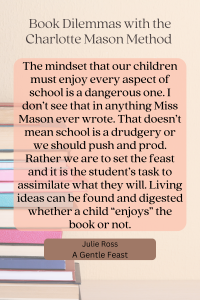When homeschooling with Charlotte Mason’s philosophy, there are many book lists for studying and experiencing different topics. These books are referred to as “living books” and have depth and content that allow students to study subjects through relevant, insightful, and engaging stories. Sometimes, students say they are bored or don’t like a book, so parents want to substitute other books to keep the student engaged. I do not believe substitutions are the answer.
For instance, this happened when my 5th grader started reading “Bully For You, Teddy Roosevelt” by Jean Fritz. After the 20 minute timer went off, she came over to give me her narration. The first words out of her mouth were, “Mom, this book is boring.” My response was, “Oh,ok. I’ll bet you will be finished with this book by the end of the week. Then you will be on to a different book. But in the meantime, I know you are going to learn so many interesting things about Teddy Roosevelt. What did you learn today?”
Fast forward to the end of the week, she is running over to me while I’m making lunch, “Mom! Did you know Teddy Roosevelt was a cowboy?” Me: “No way. That is so cool!”
After she finished her narration, I commented, “Too bad that book was boring.” After rolling her eyes at me, “Ok, mom. It wasn’t that bad. But it wasn’t the most interesting book I’ve ever read.”
What did my 10 year old learn from this experience:
- Books aren’t always going to be interesting.
- If we read a book we don’t like, we can still learn something new.
- Books don’t last forever, a different one will come along when we are finished.
- Teddy Roosevelt was a pretty neat fella.
What my 10 year old did NOT learn:
- We must love and enjoy every book in order to learn from it.
- If I don’t like a book and complain, my mom will find a different one for me.
- There is no point persevering with something that is difficult.
Here’s what Miss Mason had to say on the subject:
“We need not ask what the girl or boy likes. She very often likes the twaddle of goody-goody story books, he likes condiments, highly-spiced tales of adventure. We are all capable of liking mental food of a poor quality and a titillating nature; and possibly such food is good for us when our minds are in need of an elbow-chair; but our spiritual life is sustained on other stuff, whether we be boys or girls, men or women. By spiritual I mean that which is not corporeal; and which, for convenience sake, we call by various names––the life of thought, the life of feeling, the life of the soul.” (Vol. 3, p. 168)
My honest opinion is that the mindset that our children must enjoy every aspect of school is a dangerous one. I don’t see that in anything Miss Mason ever wrote. That doesn’t mean school is a drudgery or we should push and prod. Rather we are to set the feast and it is the student’s task to assimilate what they will. Living ideas can be found and digested whether a child “enjoys” the book or not.

Another common conversation is that certain books may be too challenging for their children. Charlotte Mason addresses this directly when she says:
“The completeness with which hundreds of children reject the wrong book is a curious and instructive experience, not less so than the avidity and joy with which they drain the right book to the dregs; children’s requirements in the matter seem to be quantity, quality and variety: but the question of books is one of much delicacy and difficulty. After the experience of over a quarter of a century in selecting the lesson books proper to children of all ages, we still make mistakes, and the next examination paper discovers the error! Children cannot answer questions set on the wrong book; and the difficulty of selection is increased by the fact that what they like in books is no more a guide than what they like in food.” (Vol. 6, p. 248)
Here we see Charlotte Mason making several points:
- Children need quantity, quality, and variety of books
- Choosing the right book is a delicate and difficult task
- One child may love a book, while another may not love that same title
- Even after 50 years, the PNEU made mistakes when choosing the difficulty level of a book.
- The “rightness” of a book wasn’t made evident until the end of term examinations. Was the child able to answer the exam questions in a thorough manner?
- The determination of the appropriateness of a book can’t be judged based on whether the child likes the book or not.
If your child is finding a book difficult to read or comprehend, there are things you can do to help as they work through it. For example, shortening the reading assignment so they have less to process through each reading session. Asking for narration after every page instead of at the end of each chapter allows them to work through smaller chunks, giving them confidence for the next page. By becoming your child’s coach and working through the book alongside them, you can see how and where they are struggling so you can meet them there.
As a parent, you must go through a process of realization about living books and how much cognitive muscle it takes to read them. Start small and add more just like you would do in the weight room. Show extra empathy while expressing confidence in your child’s ability, because stretching can be uncomfortable and the resistance isn’t personal. Just as being in the gym with a personal trainer, their job is to help you push through the discomfort. They don’t take it personally when you complain and resist taking it to the next level. As a homeschooling parent, it is important to help them in the same way.
Another way you can help your children is to resist resorting to textbooks. Textbooks are easier to understand. Predigested food is given to baby birds, but as the bird matures they need to hunt for their own food. Trust your child to do the work of their self-education. Their self-education depends on you building in the habit of attention, for you and your children.
As you prepare for the lesson, pre-read/skim and build interest for the lesson by discussing some of the things your child will read and learn about. This will help them go into the lesson with less resistance as they are already interested in the content. Another way to gain interest is by allowing them to act out, draw, or give an oral narration when the text is difficult as they build the comprehension muscle. This will allow the ability for those narration skills to be built.
Allow older students to underline, mark difficult words, make outlines, and find other ways to understand more challenging material. Find tools and strategies that work for each individual student, and teach them how to use them effectively.
Last but not not least, do not fear the audio book! When your student is struggling with comprehension with reading, the audio book can allow them to process differently and take notes as they listen.
When approaching perceived difficulties or lack of interest with living books, do not be quick to substitute easier, more interesting books because your children ask you to. Remember that they are capable of more than they believe, and it is not only acceptable, but necessary to push them into places that are uncomfortable in order to develop skills that will benefit them in their lives.

How would you suggest encouraging stretching and growth when you get pushback in a more exercise based class, such as handwriting? My daughter in form 1 (2nd grade) loathes handwriting and pushes back on it a lot!
This is obviously not from A Gentle Feast, but I’ve had the same problem and have found requiring smaller amounts gives them a feeling of success and as they are more used to doing the work and more capable, I increase the amount they do. I usually just start with, “all you have to do today is write this one word the best you can, then you’re done”. I might have to sit there and oversee the whole event and help them evaluate what they’re best means or looks like and require a redo if theyre lazy, but usually they’re so pleased with so little to do they hop right on it and are done quickly. I usually build a sentence a word at a time for a week or two, then go to 2 words, then a few more and continue increasing until the child is doing the amount I desire. I also usually don’t use the curriculum at this point but pick my own sentences about something they are interested in, just for this initial learning period. It feels ridiculous but so far it has been very effective with my 3 kids. Good luck with your kiddo!